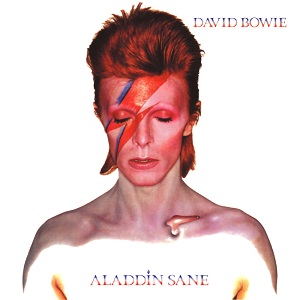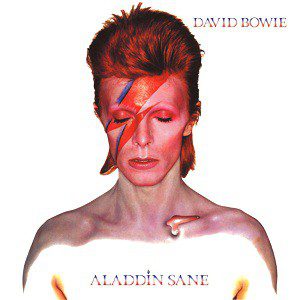When David Bowie recently died at the age of 69 we mentioned that the great performer was involved with occult ideas and that there was a Torquay connection. There seemed to be some interest in this so here’s some more information.
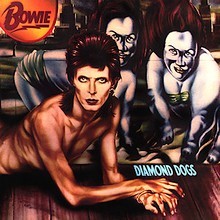
Bowie performed three times in Torquay in the early stages of his career – at the Rainbow Pavilion in 1972 and at the Town Hall in 1973, where he played a matinee and evening show on the same day. There is a deeper relationship with our town, however, and the following is about his involvement in occult and esoteric ideas associated with Torquay.
First of all, we need a brief definition of the occult. We’re really talking about the search for hidden knowledge. The occult isn’t a system, but a collection of bits of tradition and beliefs which can lead to seeing everyday things and events as having some kind of secret meaning. The 1960s were a particular time when some of us began to look for lost and concealed wisdom, beyond that offered by science or by established religion.
It’s been suggested that the whole revival of interest in the occult began with the book ‘Morning of the Magicians’ by Louis Pauwels and Jacques Bergier, first published in France in 1960 and translated into English in 1963. This created a wave of speculation and conspiracy theories, one of which was that aliens had visited mankind thousands of years ago. Along with many other artists of the time, Bowie was intrigued by these new possibilities and from then on his constructed personalities paralleled his interests and his life – ‘The Rise and Fall of Ziggy Stardust and the Spiders from Mars’ describes a universe of fallen alien messiahs playing the guitar, for instance.
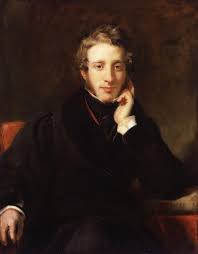
There were three main Torquay residents who influenced Bowie’s music and outlook. The first was Edward Bulwer-Lytton (pictured above) who died in 1873 at his home Argyll Hall on Warren Road, having lived there since 1867. Built in 1849, Argyll Hall became the Roseland Hotel and is now an apartment block called Marine Palms. The house occupies a prominent position on Rock Walk and can be seen as you head towards the harbour side from the Paignton direction.
In 2013 as part of his ‘David Bowie Is’ exhibition, the ‘Thin White Duke’ gave a list of his 100 favourite books. One was Edward’s ‘Zanoni’ (1842), possibly the most influential occult book of the nineteenth century. This earned Bulwer-Lytton the respect of the leading figures of the nineteenth century occult revival. Consequently, a number of societies claiming hidden knowledge have seen him as one of their own. He has been suggested as a member of the Rosicrucians, Theosophists and the Hermetic Order of the Golden Dawn – the primary organisation devoted to the study and practice of the occult, metaphysics and paranormal during the late 19th and early 20th centuries.
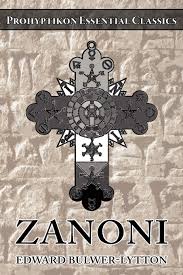
The other influential Bulwer-Lytton book was his 1871 novel, ‘The Coming Race’ where a man finds an entrance to a hollow earth to discover an ancient super people described as a, “race akin to man’s, but infinitely stronger of form and grandeur of aspect” who use an energy called “vril”. Note Bowie’s references in ‘Oh! You Pretty Things’, “You gotta make way for the Homo Superior. They’re the start of a coming race”.
Unfortunately, the notion of perfect spiritual humans and alien messiahs was easily linked to ideas of Aryan perfection, fascist imagery and the thinking of the German philosopher Friedrich Nietzsche. For Bowie this speculation was fuelled by serious cocaine abuse. When a young journalist visited for a Rolling Stone magazine interview in 1975, he found a paranoid Bowie lighting black candles to protect himself from supernatural forces. In a 2009 interview with his biographer Mark Spitz, Bowie revealed the negative influence of the drug, “My psyche went through the roof, and it just fractured into pieces. I was hallucinating 24 hours a day.”
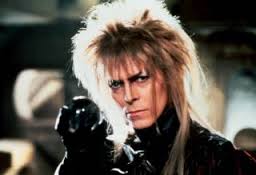
The imagery of Nazi occultism was meant to shock an audience and provide a rock and roll spectacle. Such fascism, for Bowie, was more about fashion than politics. The association with fascist imagery was also stimulated by his reading that the Nazis were searching for the same hidden knowledge as were his fellow occult enthusiasts – particularly Hitler’s quest for the Holy Grail. In an interview with Arena in 1993, Bowie expressed regret that he had ignored the crimes of the Nazis, “And naively, politically, I didn’t even think about what they had done.” This is where the second Torquay influence can be found – the ‘historian’ Trevor Ravenscroft. According to the author Gary Lachman, among the 279 books on the occult Bowie was reading in the mid-1970s was Ravenscroft’s ‘The Spear of Destiny’, its Nazi, Holy Grail and supernatural themes fascinating the singer.
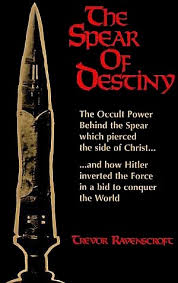
Trevor Ravenscroft (pictured below) was a commando in the Second World War, and spent four years in German prisoner of war camps. While a POW, he claimed to have experienced “higher levels of consciousnesses”. This led him to study the legend of the Holy Grail, “and to research into the history of the Spear of Longinus and the legend of world destiny which had grown around it”. The book claims that Hitler was obsessed with the biblical Spear of Destiny and that he started the Second World War to gain possession – the Spear turns out to serve the Antichrist, however. The book is seen by its fans as, “one of the most important texts in the field of Nazi occultism” – others consider it no more than inventive fiction. Trevor died in Torquay in January 1989. By the 1990s Bowie appears to have tired of Nazi occultism and had ‘The Spear of Destiny’ removed from his bookshelf, stating, “Nobody professing a knowledge of the black arts should be taken seriously if they can’t speak Latin or Greek.”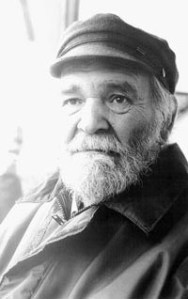
The third significant influence was Aleister Crowley (pictured right). Indeed, there may be something about Torquay: Bulwer-Lytton, the single most important occultist of the nineteenth century, and Crowley, the most notorious magician of the twentieth century, both made their homes in Torquay. As the richest town in England, we certainly attracted a variety of writers and thinkers who went beyond the usual and acceptable.
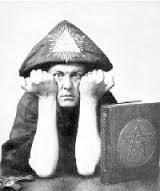
Born in 1875 Aleister was an influential mystic and magician, responsible for founding the religious philosophy of Thelema. Now recognised as one of the most influential occultists of all time, Crowley achieved widespread notoriety during his lifetime, and was denounced in the Edwardian popular press as, “the wickedest man in the world.” References to him can be found in the works of numerous writers and filmmakers. His reputation particularly appeals to musicians – Bowie, Jim Morrison and Ozzy Osbourne have all written songs featuring Crowley. That’s Aleister in the back row on the famous cover of the Beatles’ 1967 album, ‘Sgt. Pepper’s Lonely Hearts Club Band’.
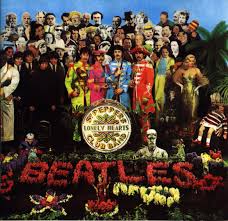
Aleister’s occult career began in Torquay where, in 1891, he lost his virginity at the age of 15 to a young actress. In 1917 Crowley referred to this encounter in a short novel ‘Not the Life of Sir Roger Bloxham’: “’Twas at Torquay in Devon, land of stream and cream…, merry maids and proper men, tall fellows and bold… and of cider stronger and sweeter than your Norman can make for all his cunning; and this girl was a play-actress, rosy as the apples, and white as the cream, and soft as the air, and high-spirited as the folk, of that enchanted dukedom…”
Later in his life, Crowley returned to Torquay, staying first at the Grand and then in a house in Barton. Incidentally, in 1952, Ian Fleming was writing his first novel entitled ‘Casino Royale’. He wanted an arch-villain to rival his new hero, James Bond. Crowley was an ideal embodiment of intelligent evil. Hence, Aleister Crowley became the model for the Le Chiffre and Ernst Stavro Blofeld characters.
Some see Aleister as a figure to be revered; others just see him as a self-publicist, an exploiter of vulnerable men and women and a fraud. Whatever your view, the Great Beast 666 certainly influenced a generation of performers. Crowley’s obsession with raising demons and manipulating dark forces fed into Bowie’s cocaine-fuelled paranoia and, notably, Torquay’s most famous occultist is referenced on ‘Quicksand’ – about a spiritual crisis – as is the Hermetic Order of the Golden Dawn:
“I’m closer to the Golden Dawn
Immersed in Crowley’s uniform of imagery”
…


